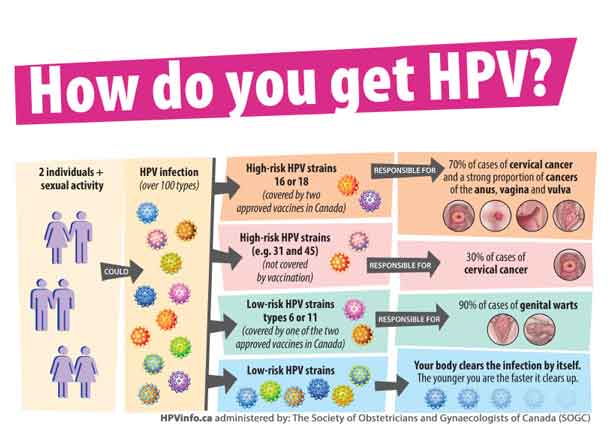

THUNDER BAY – HEALTH – There’s a term that doctors, nurses, public health educators, and even schools have been using a lot lately: ‘HPV’. However it seems that there is a lot of confusion about what it is, what it does, who can get it and how it can affect your health. Read the information below, and get the right facts about HPV.
HPV is short form for Human papillomavirus which is a common type of virus. Viruses are microscopic organisms that can infect healthy cells and cause them to grow differently.
HPV is spread during sexual activity with skin-to-skin contact. It is very important for you to know that HPV infects both women and men. There’s a common myth that men can’t get HPV, but they can. The virus does not discriminate based on sex or sexual orientation. In fact, 75 percent of Canadians will be infected with HPV in their lifetime.
There are more than 100 types of HPV, with at least 40 types that can cause genital warts or cancer. HPV types 6 and 11 cause genital warts. Genital warts are small bumps on the skin, in the genital area, that can have a cauliflower appearance. While genital warts are gross and embarrassing, cancers caused by HPV can be life-threatening if they aren’t found early.
HPV types 16 and 18 cause 70% of all cervical cancers – a preventable cancer if it is caught early by a Pap test. The cervix is the lower part of the uterus in a female’s reproductive system. Women ages 21 years and older, who have ever been sexually active, should go for a Pap test to screen for abnormal cervical cells that could lead to cancer. Having a regular Pap test every 3 years is one way to help prevent infections from becoming cancer. HPV can also cause cancer of the anus, penis, and mouth.
Often, HPV infections have no signs or symptoms, so you won’t know if you are infected. This is why it is important to protect yourself. There are a few ways that you can do this:
- If you are sexually active, practice safe sex and use condoms. However, you can still get HPV from skin that isn’t covered by the condom.
- Complete your cancer screening Pap test regularly (every 3 years).
- Get the HPV vaccine. The HPV vaccine is a safe way to protect against harmful types of HPV (types 6, 11, 16, and 18) infection.
Another common myth around HPV is that if you get the HPV vaccine you don’t have to get a Pap test. That is false. If you get the HPV vaccine, you still need to get a Pap test. Furthermore, the vaccine does not protect against pregnancy or other sexually transmitted infections, so you should continue to practice safe sex.
If you have more questions about HPV or the HPV vaccine, visit: www.hpvinfo.ca.
